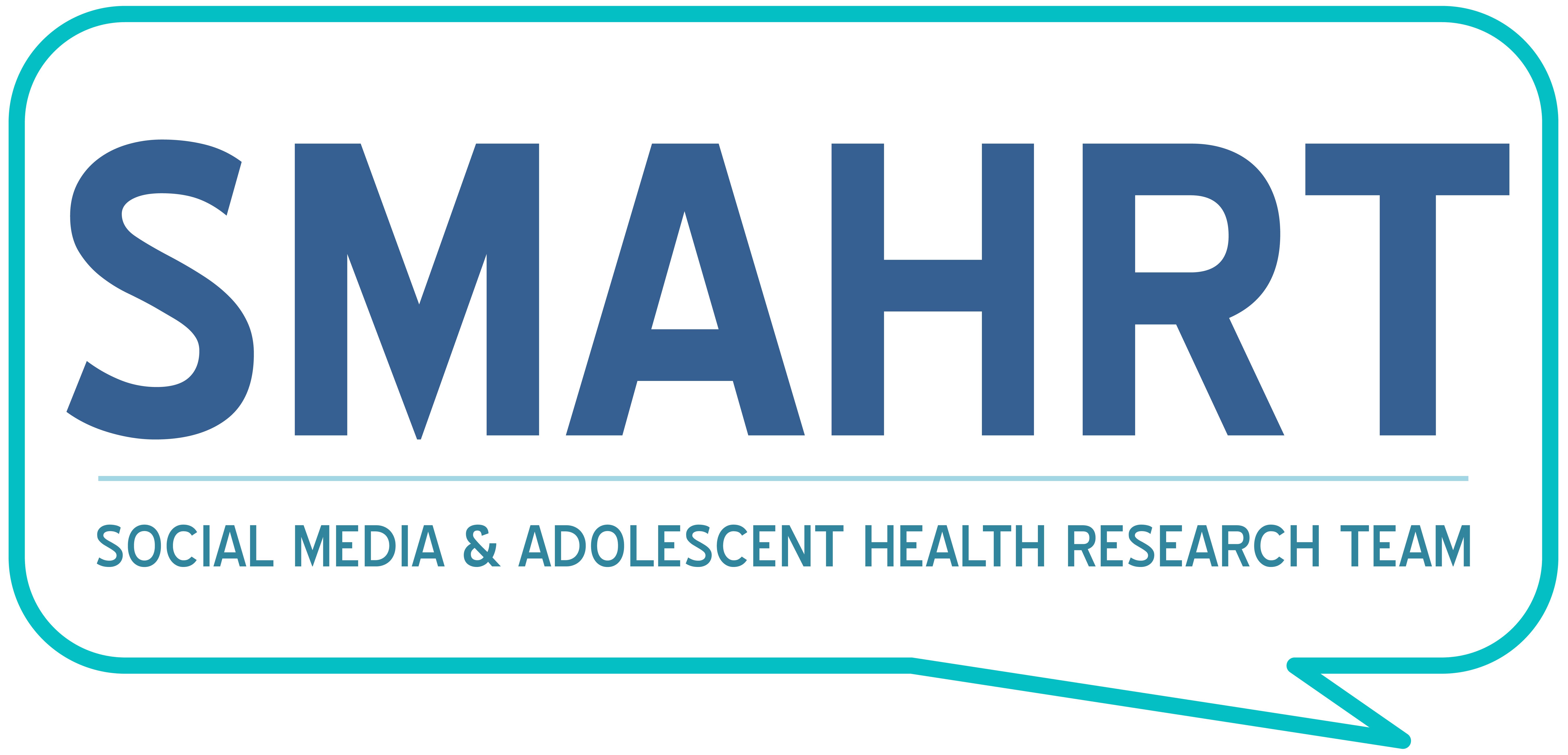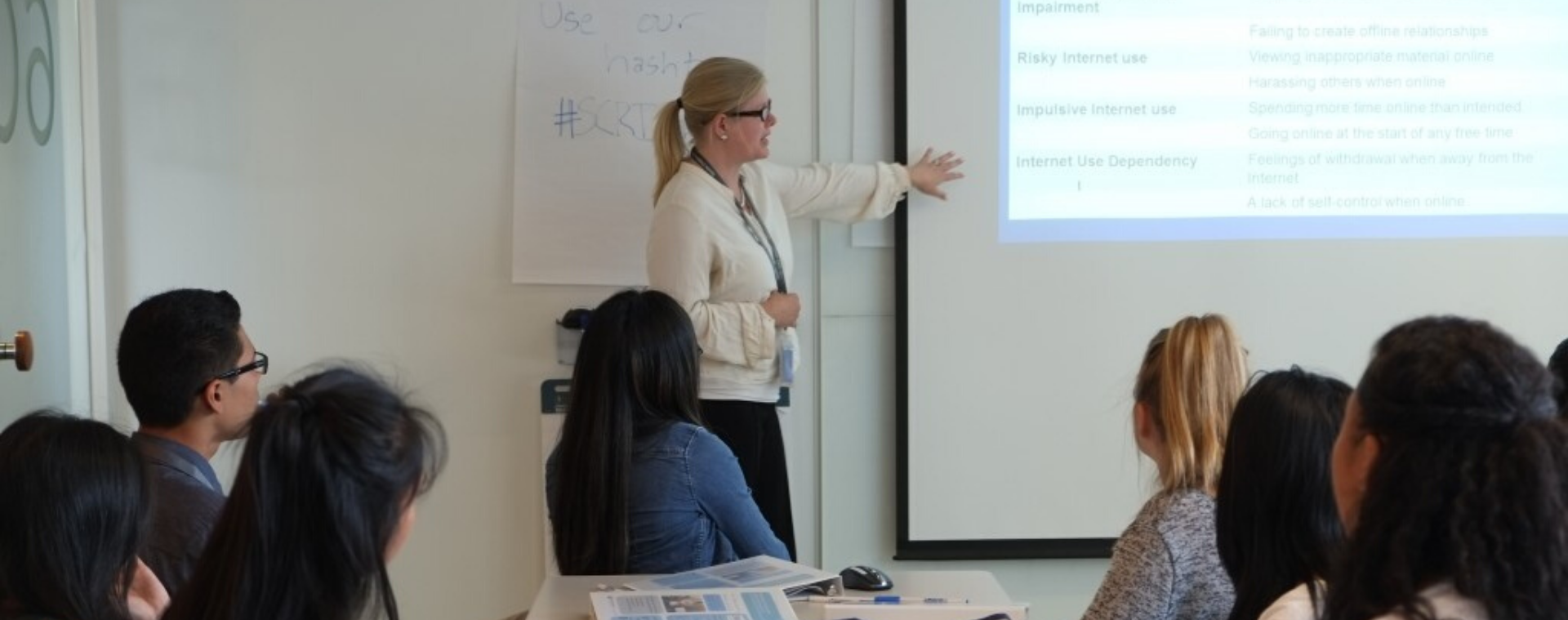One of SMAHRT’s missions is to support trainees towards improving the health and well-being of teens. This mission is what drives the mentorship program set in place by Principal Investigator, Dr. Megan Moreno. SMAHRT Staff members work with undergraduate interns on improving team projects and supporting their individual research.
The mentor relationship between Brad, Lekha, and Amrutha showcases how that support can impact their undergraduate careers.
Brad Kerr has been a SMAHRTeam member since 2011. Lekha and Amrutha are both second-year research interns on SMAHRT and have been working with Brad with two years.
“For what inspired me to be a mentor, I would say it’s a number of things. One was that I’ve always been interested in teaching in some capacity and there was a time that I considered doing a teaching degree and being an English teacher. So it’s always been on my radar,” said Brad. “Another piece is that I’ve reflected on previous lab experiences before I ever came into the team and just thought a lot about what really worked for me and what didn’t work for me, and wanted to pass on the mentoring experience that had really worked for me. The third thing is that I’ve also really always been interested in removing barriers for women and minorities in science too. So I think that mentoring kind of hits on all three of those things.”
There have been times in Brad’s mentor experience when a mentee goes on to continue research in their future. “I think those have been the most exciting and proud moments for me,” explained Brad.
Lekha is a junior undergraduate student and has been working with Brad for two years on SMAHRT. “My mentor relationship with Brad is very much an equitable relationship. I feel like it sometimes feels more like a partnership than a mentorship,” she said. “I think that is in part because previous mentors I’ve had have emphasized the power dynamic. There wasn’t really a feedback cycle, but with Brad, he’s super supportive and helpful when it comes to questions, ideas and concerns. He never really brushes away any ideas that I have, he always tries to incorporate it, which is super nice.”
With all that being said, there are times when he gives Lekha a little push on team projects or accomplishing tasks, but it’s never a demerit point in his book. “He’s seems super human to me, so that’s always nice in a mentor,” Lekha said.
Amrutha is a sophomore undergraduate student and has also worked with Lekha and Brad for two years. “I think our relationship is based on understanding and very open communication,” she explains. “I really appreciate that because I feel like I can go to him with any problem I’m facing, or if I’m really excited about doing a new topic, he’s very supportive. I feel like both of us together can kind of come up with a solution or just discuss it, and I really appreciate that.”
Brad has really enjoyed working with Lekha and Amrutha in-person this past semester. They also had a chance to attend the PRISM 2021 conference last month. “It was fun to work with them all day, but also be casual, and just kind of laugh with them. They’re all great researchers, but they’re all really fun, funny people too,” he explains.
“I feel like [this story] epitomizes how much I appreciate Brad, “said Amrutha. “Last year was my first year on SMAHRT and I did URS, so everything I’ve done was related to the class and my research project. Then towards the spring semester, the learning community I was in emailed about this opportunity which was a sophomore scholarship or fellowship to conduct your own research.”
When Amrutha found out about this opportunity, she had a very short deadline. “I was a little nervous about doing it because I didn’t really know how to go about it because you had to write a proposal that was similar to a grant proposal,” she said. “Brad was really supportive the whole way.” It was one of Amrutha’s best experiences because of Brad’s support. Throughout the process, Brad helped edit the proposal, come up with ideas for other research topics, and edit her paper.
Similarly, Lekha reflected on how Brad’s support influenced her undergraduate experience.
“I remember when I first came up with my project, which is on Nextplanon, a birth control implant, and women’s reproductive health. I didn’t really know much about it, but I just wanted to explain the idea of people to see if it would be what I wanted to do. I tried explaining it to my parents and my friends and none of them really got it because to be honest, I didn’t know much either,” said Lekha.
“I remember when I talked to Brad about it, he, I think was more excited than I was which was always really nice because I think when your teachers are really supportive, enthusiastic and happy to be there, then the students will just reflect that,” she said.
“That was definitely the case with this project, and it’s become a really important thing to me, and it’s kind of driven how I want my career to go. I don’t think if Brad was as supportive as he was, that the change in my career wouldn’t have happened. I think it’s also definitely helped with my confidence when it comes to research. Just being able to expand on any curiosity I have and move forward with it is something that I’ve definitely learned from being one of Brad’s mentees,” she explained.
“I think because of that SMAHRT will probably be like one of the best experiences I’ve had as an undergrad student. And I think that’s also really nice because when your passions and like your interests align with your career goals, that’s always a plus.”


